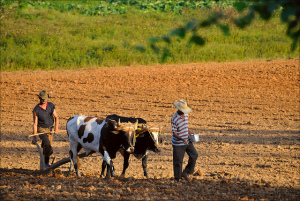Craftsmanship
by Christopher D. Cook
 |
In the fall of 1989, a full quarter-century before President Obama normalized US relations with Cuba, the Berlin Wall came tumbling to the ground in a flurry of sledgehammers and concrete dust. Meanwhile, an economic tsunami was brewing on the small Caribbean island. The Soviet Bloc was crumbling fast, sending shock waves across the globe that would plunge Cuba’s food and farming into years of austerity, hunger, and radical overhaul.
Earlier that year, the international socialist market terminated Cuba’s favorable trade rates—abruptly curtailing 85 percent of the tiny nation’s trade. Imports of wheat and other grains dropped by more than half; food rationing set in, and hunger widened. Soviet aid, a pillar of Cuba’s economy, evaporated as U.S. economic sanctions tightened.
Economic collapse led swiftly to agricultural crisis. Cuba’s industrialized farming system, fueled, literally, by Soviet tractors and petrochemicals, ground to a halt. Oil imports fell by 53 percent, and the supply of pesticides and fertilizers fell by 80 percent. Read the full article at Craftsmanship Magazine.

